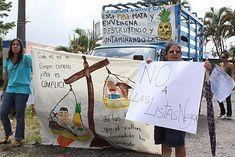
A new report into Costa Rican pineapple production claims the country’s industry is rife with questionable labour tactics, severe health risks and soil depletion.
The Interchurch Organisation for Development Worldwide, which provides financial support and advice to local organisations from a base in the Netherlands, claims to have lifted the lid on a trade pervaded by intimidation and poor agricultural practice.
The report sets out a number of demands, including asking politicians in the EU to back association agreements, asking supermarkets to engage more actively with large fruit companies and requesting that consumers buy Fairtrade where possible.
The dossier claims that workers in Costa Rica work an average of 10-12 hours a day and that contract labourers earn as little as $11 (£6.65) a day.
It also alleges: “Trade union sympathisers can be pushed out through mass lay-offs and the selective rehiring of new workers. This method is used to break emerging trade unions.”
The document accuses farms supplying Del Monte, Dole and Chiquita subsidiary Compañía Bananera Atlántica of “intimidating” workers.
The use of various agrochemicals in Costa Rican pineapple production has also been questioned by the report, suggesting they are creating water and soil pollution.
One former plantation worker, named only as Gerardo, said in the report: “In order to let the pineapples ripen quickly, we were told to use a really aggressive substance. I don’t know what it was exactly, but after I had sprayed the pineapples with it, my skin began to peel off. It was incredibly painful… They have simply fired me.”
Alistair Smith, the international co-ordinator of charity Banana Link, told freshinfo: “There are several independent scientific analyses of the presence of the main pineapple chemicals in water. In terms of residues, a small percentage of samples at this end contain pesticide residues.
“[Last week] a member of the DG SANCO mission relayed to us that the EC delegation in Costa Rica was prepared to meet the community organisations and environmental groups.”



